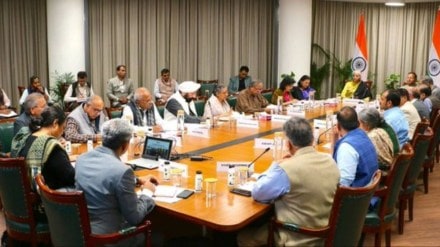A group of ten central unions on Friday called the Centre’s four labour codes, “pro employer” and an attempt of “a deceptive fraud committed against the working people of the nation”. Labelling the implementation “unilateral”, the unions said the new codes undermine the welfare-state framework.
The official statement has been signed by INTUC, AITUC, HMS, CITU, AIUTUC, TUCC, SEWA, AICCTU, LPF and UTUC, who have all jointly denounced the new codes and its implementation from November 1. The Central Trade Unions (CTUs) have now called for a nationwide protest on Nov 26 against the same
What is new in the present notification?
The Centre, through an official notification on Friday, implemented the Labour Codes. Through this, they notified the Code on Wages (2019), Industrial Relations Code (2020), Social Security Code (2020) and the Occupational Safety, Health and Working Conditions Code (2020), replacing 29 central labour laws.
Prime Minister Narendra Modi also hailed the reforms, calling it “one of the most comprehensive and progressive labour-oriented reforms since Independence”. He said the step strengthens workers’ rights and simplifies compliance.
“These Codes will serve as a strong foundation for universal social security, minimum and timely payment of wages, safe workplaces and remunerative opportunities for our people, especially Nari Shakti and Yuva Shakti. It will build a future-ready ecosystem that protects the rights of workers and strengthens India’s economic growth. These reforms will boost job creation, drive productivity and accelerate our journey towards a Viksit Bharat,” he said on X.
According to the notification by the government, the new codes expand women’s rights and protections significantly, with several progressive reforms meant to enhance workforce participation.
- Now, women have now been permitted to work at night across all sectors, including mining and heavy industries, subject to consent and necessary safety arrangements.
- Fixed-Term Employees to receive all benefits equal to permanent workers, including leave, medical, and social security.
- Gratuity eligibility after just one year, instead of five.
- The new reforms also mandate crèche facilities in all establishments with 50 or more employees.
- For the first time, India has legally defined gig workers, platform workers and aggregators within the labour framework. This brings app-based workers, such as food delivery agents, ride-hailing partners and couriers, under formal social security provisions.
- Equal pay for equal work has also been ensured.
Why are Unions against the new labour codes?
In their joint statement, the unions said the notification is arbitrary and that the Union Government ignored all their demands and suggestions. They said the code caters to “employers’ representatives and fringe supporters of the Govt”. They said multiple protests since 2019—including the January 2020 general strike, the November 26 protest with Samyukt Kisan Morcha, and a July 9, 2025 strike claimed to involve “more than 25 crores workers”—were ignored.
The statement also said that repeated requests to convene the Indian Labour Conference and repeal the codes, including during pre-budget meetings on November 13 and November 20, received no response from the government.
“This Union government has made effective the labour codes to cater to the demands of employers’ representatives… The most undemocratic, most regressive—anti-worker and pro-employer move,” they said.
The statement further read, “Implementing the codes amid deepening unemployment crisis and rising inflation is nothing short of declaration of war on the working masses.” In strong remarks, the unions claimed the Centre acted “in cahoots with capitalist cronies” to return to an “exploitative era of master-servant relationship”.
Previously, the CTUs presented its 20-Point Workers Charter at the 2026-27 pre-budget consultation on November 20, held by the Ministry of Finance.
The charter, they said, proposed measures to boost domestic demand in the face of tariff threats, proper auditing of Union government flagship schemes, and steps to reverse the declining number of audit reports placed before Parliament.
“The unions called for wider EPF and ESI coverage, higher threshold limits under labour statutes, an increase in minimum pension and scheme-worker honorariums, and the imposition of sectoral cesses to fund welfare benefits. They also sought the reversal of the decriminalisation of offences under the Boilers Act and other labour laws through the Jan Vishwas Act, and pressed for concrete job-creation measures instead of public fund transfers via schemes such as PLI, Capex Incentive and ELI, citing falling decadal employment growth, real wage growth and manufacturing growth,” it said.
There has been no official response by the government on unions’ remarks so far.
